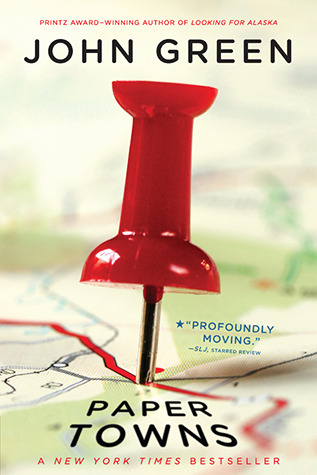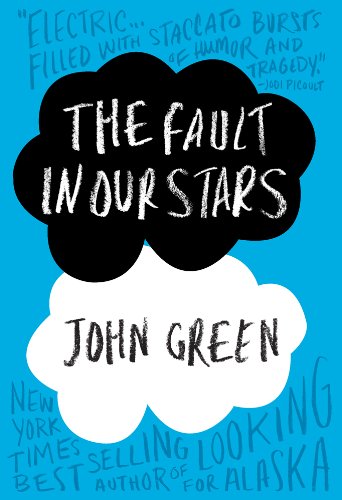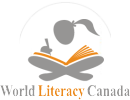
Ana's Rating
Readers Rating
Quentin Jacobsen has spent a lifetime loving the magnificently adventurous Margo Roth Spiegelman from afar. So when she cracks open a window and climbs back into his life—dressed like a ninja and summoning him for an ingenious campaign of revenge—he follows.
After their all-nighter ends and a new day breaks, Q arrives at school to discover that Margo, always an enigma, has now become a mystery. But Q soon learns that there are clues—and they’re for him. Urged down a disconnected path, the closer he gets, the less Q sees of the girl he thought he knew.
Paper is everywhere. From your mindless schoolwork to your petty job to the two-dimensional people and the two-dimensional places that satisfy them, we are living in a paper world. Thin, pliable, and easily stained, paper isn’t all bad. But to people like Margo Roth Speigelman, ‘not all bad’ will not suffice. Commitment to a higher calling abandons paper in search of something more.
Margo Roth Spiegelman has found that something more. Quentin Jacobsen, however, has not. John Green’s Paper Towns is about a boy in search of the truth– and in search of a girl who rocked his world and fled shortly thereafter.
What is youth? As a teenager, I guess that I should know. But John Green could tell you better than anyone: sweet revenge, breaking high school records and last-minute road trips with only four bathroom breaks. It’s separating your idea of people from the people themselves, wearing absolutely nothing under your graduation robes and accepting your colleagues for who they are. Introspection. Rebellion. Goodbyes. Friendship.
I cannot fathom how Green managed to incorporate all of these elements into one novel–and a short one at that–but I don’t care. It rang true, effortlessly mirroring typical teenage banter and infinitely impacting readers in a way that they will remember for the rest of their lives, or at the very least the rest of their teenage years. It is one thing to write philosophy, and it is another thing entirely to write for young adults. Green managed both while exploring the very essence of growing up.
Although I must say that Paper Towns‘ metaphysical soliloquies changed my life (or the way I view it, anyway), my favourite part the novel was honestly the nerdy characters. Any teenage girl will solemnly tell you that badass guys are fantastic, but on behalf of all self-proclaimed nerds I can attest to real-life dorks being one step above them all. Nothing beats nerdy boys swapping witty– and geeky– comments and casually quoting T.S. Eliot in everyday conversation. Don’t believe me? Just see for yourself.
Despite being the only one of us who owned the game, I wasn’t very good at Resurrection. As I watched them tramp through a ghoul-infested space station, Ben said, “Goblin, Radar, goblin.”
“I see him. Come here you little bastard,” Ben said, the controller twisting in his hand. “Daddy’s gonna put you on a sailboat across the River Styx.”
“Did you just use Greek mythology to talk trash?” I asked.
Radar laughed. Ben started pummeling buttons, shouting, “Eat it, goblin! Eat it like Zeus ate Metis!”
Expertly, Green’s characters also possess a commendable reality/relatability factor. Regardless of some of them being unwittingly held up on pedals before being stripped to the core, I was able to grow with them throughout the novel. A wonderful supporting cast pulls through once again in the most unlikely ways, and I daresay that I was wowed.
Perhaps it’s the quirkiness of Paper Towns that makes it an overall likable novel. (Awkward teenage boy narrators, their geeky friends, and the frequent use of the term ‘honneybunny’ tend to make for a quirky book.) Characteristic of John Green, this kooky style is a favourite of mine: ironic life truths spoken parallel to chuckle-inducing one-liners never fail to charm.
If Paper Towns began with a bang (and it did), it ended with fireworks. And not the gorgeous, awe-inspiring, typical fireworks that everyone and their dog love to admire, but the whimsical and understated fireworks that no one dares to showcase. This resolution was bittersweet: no hope, no love, no glory, no happy ending. Just truth. I loved it.
This novel is for you if you like nerdy jokes, old-school mysteries, references to old music and even older poetry and prose, and awkward romances between celestial beauties and socially clumsy beasts. I can safely say that John Green will be on my auto-buy list for a long time to come. 4.6/5 stars.
I’ll keep you posted,

Ana's Rating
Readers Rating
Buy The Fault in Our Stars on Amazon
Despite the tumor-shrinking medical miracle that has bought her a few years, Hazel has never been anything but terminal, her final chapter inscribed upon diagnosis. But when a gorgeous plot twist named Augustus Waters suddenly appears at Cancer Kid Support Group, Hazel’s story is about to be completely rewritten.
Insightful, bold, irreverent, and raw, The Fault in Our Stars is award-winning-author John Green’s most ambitious and heartbreaking work yet, brilliantly exploring the funny, thrilling, and tragic business of being alive and in love.
(Please excuse these disturbingly profound and insightful thoughts on The Fault in Our Stars, as I’ve just finished reading said book, which was equally profound and insightful.)
This is not a book about cancer.
Well, that’s not quite true. This is a book about the ways of the world. Illness– cancer– comes with that, I suppose.
In any case, before reading this book, or its review, for that matter, you must know that it is irrelevant, and does not pretend to be anything more. Yeah, you heard me. Irrelevant. This book is just so completely irrelevant. So keep that in mind.
First of all, I am going to talk about this book’s merit. I have never experienced the tragedy of one of my close friends dying of cancer, and do not have cancer, myself. Maybe I would not have experienced this book in the same way had this been different. However, I can sincerely recommend this book to you if you share in my ignorance of most things cancer-related. In fact, if you are as unfamiliar with cancer as I am, you must read this book. No, seriously. Read it. Read this book. *menacing face*
So, Hazel is not your typical female protagonist. She is well read, smart, and witty. She is not in school, but she values her education enough to have obtained a GED, and she takes college classes. She is not beautiful, or even cute; she blatantly admits to having a pudgy face due to steroids. Oh, and that brings me to my last point on Hazel Lancaster: she’s dying.
And maybe it is because she has been terminal since her cancer diagnosis at age 13, or maybe it’s just Hazel, but this girl has some opinions. She has opinions on the kind of things that even I don’t have opinions on– and I am not a complaisant person. Yes, The Fault in our Stars assails very, very important matters, such as people conditioning themselves to beauty, the irrevocable fact that oblivion will one day consume our world , and the heinous exclusivity of breakfast foods. I mean, come on, people. Bacon and eggs should be acceptable lunch foods, too! It would be unfair to limit them to the word ‘breakfeasty’!
As for August Waters, let me just say: wow. Just wow. He’s bright and freaking hilarious and he admits his flaws– and plays up his qualities. Having had cancer (He has now been NEC (No Evidence of Cancer) for some time), he is also incredibly deep. I mean, he buys cigarettes, but doesn’t smoke. Why, you might ask? Some sort of metaphor; putting the killing thing into your mouth but never actually giving it the power to kill you.
I’ll give you a couple of Augustus Waters teasers (although one or two snippets of his incredible wit could never measure up to actuality) :
“All salvation is temporary,” Augustus shot back. “I bought them a minute. Maybe that’s the minute that buys them an hour, which is the hour that buys them a year. No one’s gonna buy them forever, Hazel Grace, but my life bought them a minute. And that’s not nothing.”
“Why? Why would you even like me? Haven’t you put yourself through enough of this?” I asked, thinking of Caroline Mathers.
Gus didn’t answer. He just held on to me, his fingers strong against my left arm. “We gotta do something about this frigging swing set,” he said. “I’m telling you, it’s ninety percent of the problem.”
*Sigh*
Based on this, you can obviously determine that the romance between these two characters is beautiful. (Yes, that’s the right word.) It’s not spray tan romance, or lust, or even based on outward appearance in any way. There are just two people who understand each other, and they suit each other perfectly. It’s the kind of couple that you see, and you think “Wow. They just fit. They’d be crazy not to love each other.” (Of course, I might fit with Augustus Waters, too. It’s a possibility.)
Basically, The Fault in our Stars made me laugh and cry and scream more times than I can count on two hands. It’s just that kind of book. At one point, I actually cried so much and for such a prolonged period of time that my sister went and got me a wipe for my mascara. My sister is two. Yeah, it was that bad.
But don’t let that scare you away. The Fault in Our Stars is pure awe. It is just magnificent. Amazing. Wonderful. As stated previously, it is not a book about cancer. It is a book about life. And there cannot be life without death. In some cases, that death just comes prematurely.
Five stars. The Fault in our Stars is an emotional whirlwind, an epic, and an infinity of questions and possibilities compacted into 313 pages of laughter and tears. And there’s no way that that combination could exist without it being rated 5 stars.
I’ll keep you posted,


![[Twitter]](http://www.whatyareading.com/wp-content/plugins/bookmarkify/twitter.png)
